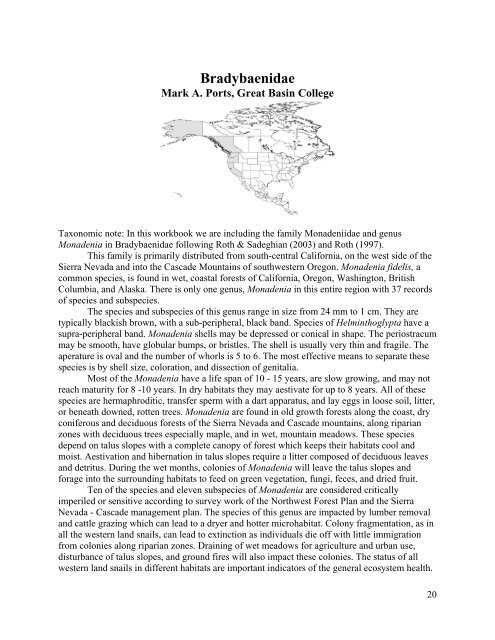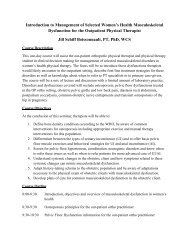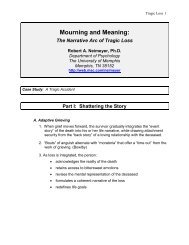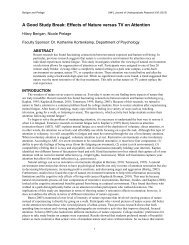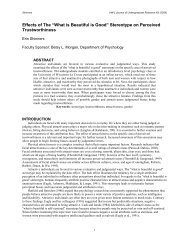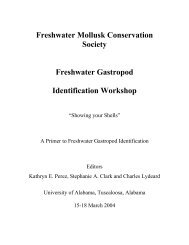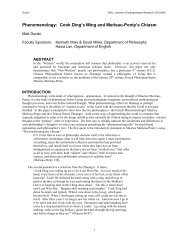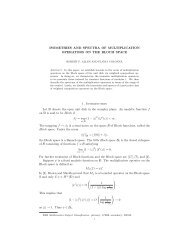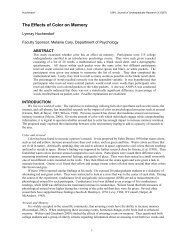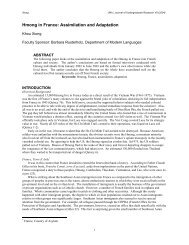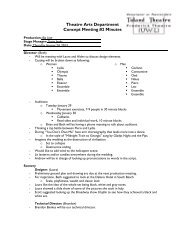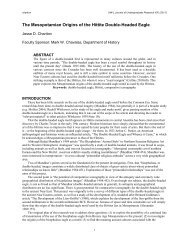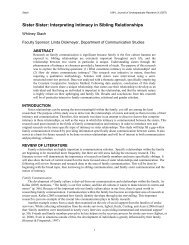A Guide for Terrestrial Gastropod Identification - University of ...
A Guide for Terrestrial Gastropod Identification - University of ...
A Guide for Terrestrial Gastropod Identification - University of ...
Create successful ePaper yourself
Turn your PDF publications into a flip-book with our unique Google optimized e-Paper software.
Bradybaenidae<br />
Mark A. Ports, Great Basin College<br />
Taxonomic note: In this workbook we are including the family Monadeniidae and genus<br />
Monadenia in Bradybaenidae following Roth & Sadeghian (2003) and Roth (1997).<br />
This family is primarily distributed from south-central Cali<strong>for</strong>nia, on the west side <strong>of</strong> the<br />
Sierra Nevada and into the Cascade Mountains <strong>of</strong> southwestern Oregon. Monadenia fidelis, a<br />
common species, is found in wet, coastal <strong>for</strong>ests <strong>of</strong> Cali<strong>for</strong>nia, Oregon, Washington, British<br />
Columbia, and Alaska. There is only one genus, Monadenia in this entire region with 37 records<br />
<strong>of</strong> species and subspecies.<br />
The species and subspecies <strong>of</strong> this genus range in size from 24 mm to 1 cm. They are<br />
typically blackish brown, with a sub-peripheral, black band. Species <strong>of</strong> Helminthoglypta have a<br />
supra-peripheral band. Monadenia shells may be depressed or conical in shape. The periostracum<br />
may be smooth, have globular bumps, or bristles. The shell is usually very thin and fragile. The<br />
aperature is oval and the number <strong>of</strong> whorls is 5 to 6. The most effective means to separate these<br />
species is by shell size, coloration, and dissection <strong>of</strong> genitalia.<br />
Most <strong>of</strong> the Monadenia have a life span <strong>of</strong> 10 - 15 years, are slow growing, and may not<br />
reach maturity <strong>for</strong> 8 -10 years. In dry habitats they may aestivate <strong>for</strong> up to 8 years. All <strong>of</strong> these<br />
species are hermaphroditic, transfer sperm with a dart apparatus, and lay eggs in loose soil, litter,<br />
or beneath downed, rotten trees. Monadenia are found in old growth <strong>for</strong>ests along the coast, dry<br />
coniferous and deciduous <strong>for</strong>ests <strong>of</strong> the Sierra Nevada and Cascade mountains, along riparian<br />
zones with deciduous trees especially maple, and in wet, mountain meadows. These species<br />
depend on talus slopes with a complete canopy <strong>of</strong> <strong>for</strong>est which keeps their habitats cool and<br />
moist. Aestivation and hibernation in talus slopes require a litter composed <strong>of</strong> deciduous leaves<br />
and detritus. During the wet months, colonies <strong>of</strong> Monadenia will leave the talus slopes and<br />
<strong>for</strong>age into the surrounding habitats to feed on green vegetation, fungi, feces, and dried fruit.<br />
Ten <strong>of</strong> the species and eleven subspecies <strong>of</strong> Monadenia are considered critically<br />
imperiled or sensitive according to survey work <strong>of</strong> the Northwest Forest Plan and the Sierra<br />
Nevada - Cascade management plan. The species <strong>of</strong> this genus are impacted by lumber removal<br />
and cattle grazing which can lead to a dryer and hotter microhabitat. Colony fragmentation, as in<br />
all the western land snails, can lead to extinction as individuals die <strong>of</strong>f with little immigration<br />
from colonies along riparian zones. Draining <strong>of</strong> wet meadows <strong>for</strong> agriculture and urban use,<br />
disturbance <strong>of</strong> talus slopes, and ground fires will also impact these colonies. The status <strong>of</strong> all<br />
western land snails in different habitats are important indicators <strong>of</strong> the general ecosystem health.<br />
20


